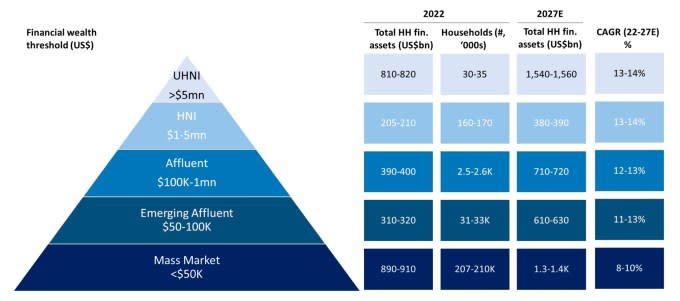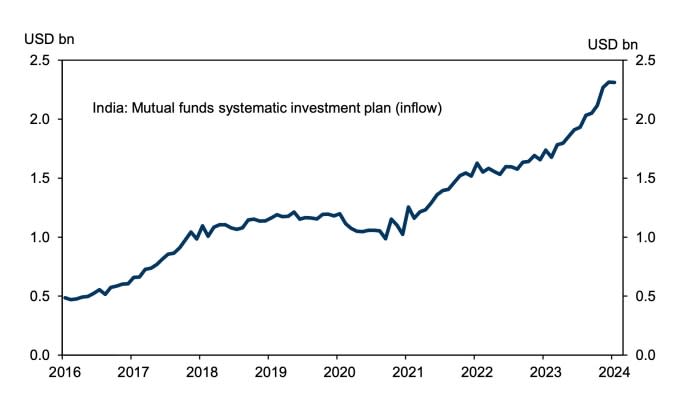Investors chase wealth tech startups in India as affluent class grows
Investors are betting on Indian wealth tech startups as a growing middle class turns to diversify investments and startups challenge traditional financial advisors for high-net-worth clients.
Premji Invest is in advanced stages of talks to lead a funding round of $30 million to $40 million in Dezerv, an app offering a suite of investment solutions to India's wealthy, three sources familiar with the matter told TechCrunch. The current talks value Dezerv at about $170 million pre-money, more than doubling its valuation since its last funding round.
A day after the publication of this story, Dezerv announced it had raised about $32 million in a round led by Premji Invest. "Over 65% of HNI portfolios often suffer from underperformance due to mis-selling and over-diversification. We address these issues with trusted, customised investment solutions, centrally managed portfolios, and a technology-first approach for superior client experiences," said Sandeep Jethwani, co-founder of Dezerv, in a statement.
Lightspeed Venture Partners is in advanced talks to lead an investment round larger than $20 million in Centricity, a digital wealth management platform, two sources said. In October, Peak XV agreed to invest about $35 million in wealth and asset management startup Neo.
The high-net-worth and ultra-high-net-worth segments are booming in India, prompting some wealth management firms to aggressively expand their relationship manager networks to capture this market. Only about 50-55% of India's wealth management market is currently under professional management, according to analysts.

A significant portion of these services remain relationship-driven and demand a bespoke approach. Investors are betting that startups can cut out the middlemen, offer more personalized and data-driven recommendations to customers and also serve a class of the market currently neglected by incumbents.
Accel-backed Scripbox has had a turnaround in its business in the last two years, an industry analyst quipped. It has turned profitable, is "well capitalized" and manages assets of over $2 billion, Scripbox founder and chief executive Atul Shinghal told TechCrunch.
The broader India bet
India is also experiencing a surge in the financialization of its economy, with significant growth witnessed in sectors like insurance and mutual funds. The number of mutual fund accounts is up 3.5x since 2015, with exponential gains in low ticket size systematic accounts over the past three years, according to Macquarie.
And there's still a lot of room for growth: India's ratio of mutual fund AUM-to-GDP is at 15% versus a global average of 75%, according to Macquarie. "As penetration improves, we believe the mutual fund industry can quite comfortably continue to grow at 20% for the foreseeable future," they wrote in a note. This optimism is echoed in long-term growth projections from major financial institutions. UBS estimates a 22-25% CAGR in active AUM over FY24-27E for leading players in the wealth management space.
A number of startups are also making inroads helping more Indians invest in mutual funds, stocks and gold. Jar, backed by Tiger Global, allows customers to build a habit of savings. The startup, targeting a $100 billion Indian gold market, is already seeing its average customer make 22 investments each month, Nishchay AG, its co-founder, told TechCrunch.
India's affluent population is poised for explosive growth. The number of individuals with annual incomes exceeding $10,000 is expected to more than double in the next five years, according to UBS, providing a strong tailwind for financial services platforms targeting this demographic. Industry has taken note.

360 One WAM, India’s largest wealth manager focused on ultra-high-net-worth individuals, agreed to acquire popular Indian mutual fund investment app ET Money for about $44 million last month.
CRED agreed to acquire mutual fund investment platform Kuvera earlier this year. Smallcase, a startup that CRED evaluated for an acquisition earlier but passed, is in talks to raise $40 million at about a valuation of $240 million, according to three people familiar with the matter.
Eight Roads, a venture firm affiliated with Fidelity, is evaluating an investment in Asset Plus, another mutual fund platform, according to two people familiar with the matter.
And more competition is on its way.
Reliance, India's most valuable firm, partnered with BlackRock, the world's largest asset manager, last year to form a joint asset management venture in India. BlackRock and Reliance’s finance unit are targeting an initial investment of $150 million each into the new 50/50 venture, which will seek to offer tech-enabled access to "affordable, innovative" investment solutions for millions of investors in India, the two said last year.
In April, they announced another joint venture that will seek to offer wealth management and broking business in India.

 Yahoo Lifestyle
Yahoo Lifestyle 
